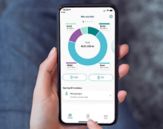Liquidity funds
Save for unforeseen events with quick access to the money.

Expected higher return than in a bank account
Quick access to the money
On your mobile phone you buy liquidity funds in The Spare app
What is a liquidity fund?
A liquidity fund is a fixed-income funds that buys fixed-income securities that have a short term, between three months and one year.
Liquidity funds are the group of funds with the very lowest risk. A liquidity fund is a fixed-income fund that invests exclusively in securities with a short lock-in period. However, lowest risk also means lowest expected return. Over time you can expect to get a slightly higher return than in a high-interest bank account.
When should I choose a liquidity fund?
Consider choosing a liquidity fund if it is money you may need quickly, for example if your car needs to go in for repairs or your washing machine stops working.
Saving in a liquidity fund is also a good solution for people who want to combine this with investments in equity funds so you can adjust the risk in your overall savings portfolio.
If you are looking for a very high return on your money, liquidity funds are not for you. In that case you are better off looking at savings with a higher level of risk which are more suited to long-term savings such as equity funds or individual shares.
How much does a liquidity fund cost?
The costs of a liquidity fund, better known as annual management costs, vary from liquidity fund to liquidity fund. It is stated as a percentage and is deducted annually from the money you have in the liquidity fund. See the cost of each liquidity fund in Spare.
Bond funds
Save money for major purchases where you don’t need immediate access to the money.

Spare
Spare is the app that helps you keep track of your savings.
Historical returns are no guarantee of future returns. Future returns will depend, among other things, on market developments, the skill of the Portfolio Manager, the mutual fund’s risk, and the management costs. Returns may be negative as a result of mark-to-market losses.
Compare our prices with other companies at Finansportalen.no.
Our mutual fund products
Mutual fund list
Get a full overview of all our mutual funds
Digital adviser
Get customised research and investment suggestions adapted to you.
Equity funds
For people who want to save long term and can tolerate fluctuations
Index funds
Equity fund for people who prioritise low costs
Fixed-income funds
Mutual funds that invest the money in fixed-income securities
Balanced funds
Balanced funds invest in both fixed-income securities and shares
Share savings account
Makes it easier for you to save in shares and equity funds
Investment account
Access to both securities and mutual funds in the same solution